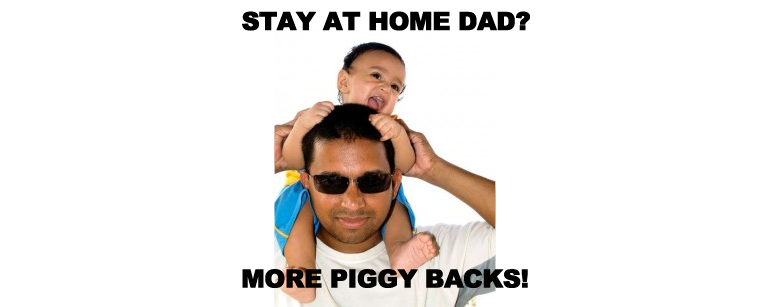M is asleep in her Dad’s arms. There is a huge wet spot on his shirt, where she’s been drooling. He points at her with his free arm and then at her crib. “I really need to go to the bathroom,” he mouths, not wanting to wake her.
Although it’s becoming more common, there’s still a bias against stay at home Dads. Someone posts a joke or advice on my Facebook at least once a week about getting fathers to help with the kids. I’ve seen posts talking about how Dads do only the fun stuff, or how men don’t change dirty diapers. It’s an unfortunate bias, as my experience has been that many men really want to be with their kids, but are afraid to ask.
I maintain that there is no reason that a Father shouldn’t be the one at home with the kids, as long as that’s what he wants and the mother would prefer to work. But, were those women right? How does it affect the child with a stay at home dad?
 Conventional wisdom says that women should raise children because women are more nurturing. However, evidence shows that a father is an incredibly important part of a child’s life. A study in 1996 conducted by McGill University found that the “single most important childhood factor in developing empathy is paternal involvement in childcare.” The single most important factor. Think about that for a moment. The role of a father is more important than wealth, more than academic opportunities or anything else.
Conventional wisdom says that women should raise children because women are more nurturing. However, evidence shows that a father is an incredibly important part of a child’s life. A study in 1996 conducted by McGill University found that the “single most important childhood factor in developing empathy is paternal involvement in childcare.” The single most important factor. Think about that for a moment. The role of a father is more important than wealth, more than academic opportunities or anything else.
Another study conducted by a professor of child development at the University of Chicago found that the stay-at-home father was the best arrangement for the child. In the traditional arrangement, where fathers work and mothers stay home, the role of the father tends to be minimal and the role of the mother tends to have more impact. Interestingly enough, when the father stays home, the relationship between parents is more balanced, which contributes strongly a child’s overall sense of well-being.
My daughter is a lucky kid, although she doesn’t know it yet, both of her parents are home with her every day. I work from home and my husband is a stay at home dad. Before she was born, he was career oriented — I can count on one hand the number of days he missed at his job in five years — but as soon as he saw her face, his priorities changed. The first thing I remember after waking up from my C-Section was him sitting cross-legged on the couch, holding his newborn daughter in his arms with the most intense look of wonder and awe that I have ever seen. One day, she said her first word: “Dada.” That night, he told me he wanted to be there every day with her. We rearranged some things and I went back to work as soon as I could.
Growing up, my Dad raised my brother and I while Mom worked – his was 25 years ago, when it was still rare. I still remember the comments from strangers when he took us to the store. Women would come up to us and say something like, “Oh, isn’t it nice that you’re helping your wife with the grocery shopping,” or “How sweet of you to take the kids so your wife can have a break.” When he explained that he was our primary caretaker, the responses varied from head-shaking and walking away to “Those poor kids. They’re going to grow up not knowing what’s right.”
Childwelfare.gov echoes these sentiments by discussing the numerous benefits of a father having an active role in the child’s life. Children who have a father as a primary care-giver tend to have happier marriages, since the workload tends to be more evenly divided. They perform better academically and have higher test scores. They are also more likely to be emotionally secure as teenagers and adults and are less likely to experiment with drugs, sex or alcohol. Pretty powerful stuff.
Pyschcentral.com says that the role of the father is especially important for girls. After all, the first relationship that a girl will have with a male is with her father – it sets the standard for the rest of her life. How her father treats her mother will affect the sorts of relationships she will have in the future. (So, fathers, if you want your daughter to marry a good man, then be a good father to her.) For girls, it also allows her to see an alternative to traditional gender roles and shows by example that women can work outside the home and fathers can be caregivers. This provides a more balanced view of her role as an adult; she’s less likely to assume that her place is in the home and she should marry a man who can provide for her. For boys, it also shows there is no shame in being nurturing, something that has been a hurdle historically for boys.
Of course, there are also financial benefits. CNN reports that in most parts of the country, the cost of childcare for two children exceeds the average cost of rent. This leads a lot of parents to seek out lower quality childcare, which is probably not optimal for the child. It also turns out that it is beneficial for the father’s emotional well-being, according to a new study by the University of Texas. When fathers choose to stay home with their children, they feel more fulfilled. They do still feel push-back from societal pressure, but this is decreased by having a community of other fathers who stay home with their kids as well.
All in all, the role of the father cannot be underestimated and the benefits are more defined when the father stays home with the children. And, if the mother wants to work, it turns out to have a financial benefit as well, which means that there is more money available to spend on the kids.
M has woken up from her nap. The first word out of her mouth is “Dada.” This is quickly followed by “Dada, baba!” Clearly, I’m chopped liver! But, she’s happy. And with her Dad around, all of the time, I expect she’ll remain so. At least, until she becomes a teenager.


